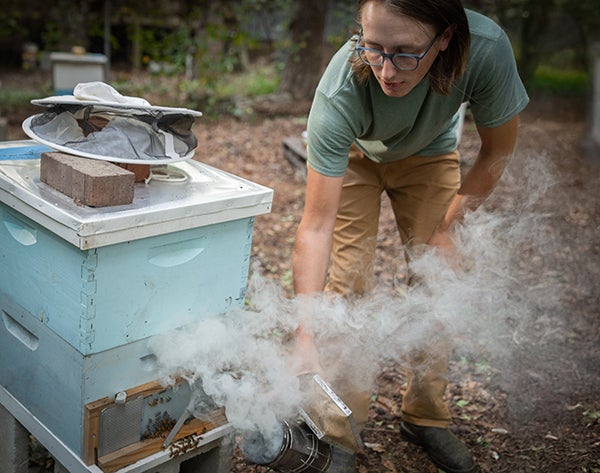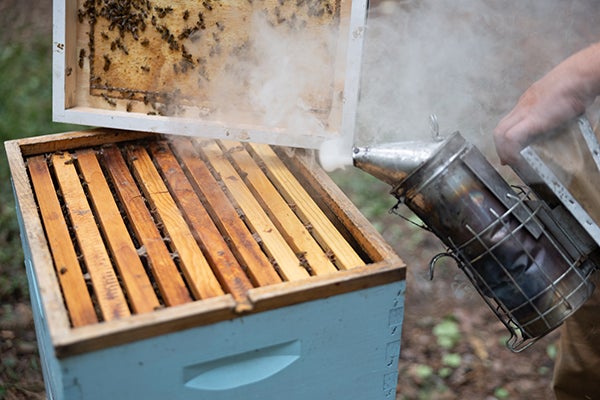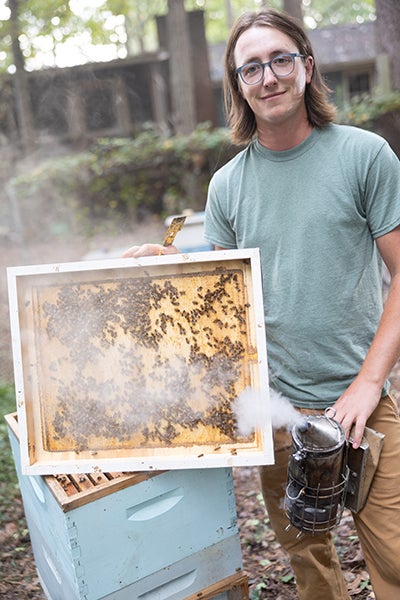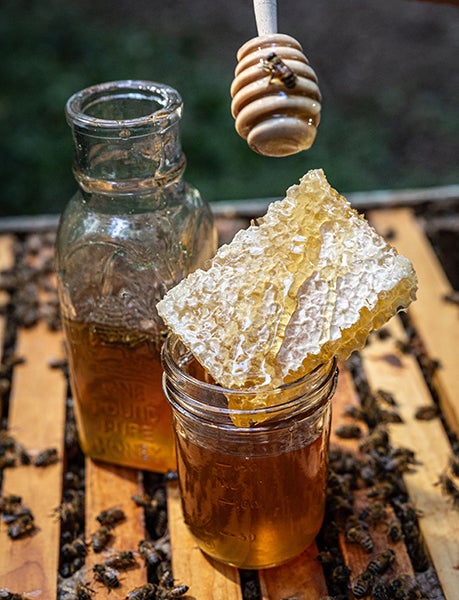Honey & Your Heart — What’s the Buzz?
February 17, 2025
Sweet and syrupy, honey is a natural alternative to sugar that offers surprising health benefits, even for the heart. And, here in the Piedmont region of North Carolina, honey is harvested during the summer (June specifically), which means by fall and winter, there should be an ample supply of nature’s sweetener wherever you shop.
Let’s dive into all that honey has to offer.
The Making of Honey

Honey is made exclusively by honeybees — these important pollinators gather nectar from flowers, take it to their hives, and “chew” it down into simple sugars. There are more than 300 types of honey in the United States, with color and flavor varying based on the original source. In North Carolina, the most popular honey is sourwood, made in the mountains and harvested in July. Here in the Piedmont, wildflower honey is the most common.
Honeybees & North Carolina
 While honey is tasty and healthy, this natural sweetener is just one of the many benefits bees bring to our world. The U.S. Department of Agriculture reports that scientists estimate that one out of every three bites of food we eat exists because of pollinators, including bees. Raleigh beekeeper Jackson Brinkley explains the benefits of bees to our North Carolina ecosystem (and economy!).
While honey is tasty and healthy, this natural sweetener is just one of the many benefits bees bring to our world. The U.S. Department of Agriculture reports that scientists estimate that one out of every three bites of food we eat exists because of pollinators, including bees. Raleigh beekeeper Jackson Brinkley explains the benefits of bees to our North Carolina ecosystem (and economy!).
“Bees pollinate our world — allowing for the reproduction of many plants, trees, fruits and vegetables. In North Carolina, our farmers need bees to produce crops, such as soybeans, pumpkins, melons, apples, peaches, strawberries, blackberries, blueberries, muscadine grapes, cucumbers, cotton, peanuts, alfalfa, squash, beans and more. Planting native plants – especially trees — can help provide nectar sources for our very hungry NC bee population,” explains Brinkley.
How Honey Compares to Sugar
Honey is often compared to sugar as a natural and healthier sweetener. While honey is made up of two types of sugar (glucose and fructose), it also contains amino acids, vitamins, minerals and antioxidants, such as flavonoids and polyphenols, that give it anti-inflammatory properties.
When compared to regular sugar, honey may offer benefits as it relates to blood sugar management. While honey can still raise blood sugar levels, its antioxidants may protect against type 2 diabetes and metabolic syndrome. Additionally, a 2018 study published in Nutrients indicates that eating honey daily may improve fasting blood sugar levels in those with type 2 diabetes.
However, honey is still a “form” of sugar and should be consumed in moderation. Medical experts recommend sugar be limited to less than 10 percent of total daily calories.
 Is Honey Heart Healthy?
Is Honey Heart Healthy?
A 2020 study published in the International Journal of Environmental Research and Public Health indicates that honey may offer several heart healthy benefits, such as lowering blood pressure, improving blood fat levels, regulating your heartbeat and preventing the death of healthy cells.
Honey contains several antioxidants, substances that can help fight against unstable molecules in the body (or free radicals). These antioxidants may also help reduce inflammation that can lead to problems such as heart disease and high blood pressure.
Additionally, raw honey contains propolis, a resin bees produce from sap-making plants. Research published in a 2019 issue of Nutrients shows that propolis may improve cholesterol and triglyceride levels. Cholesterol and triglycerides are fats that can increase the risk of heart disease and other serious health conditions.
Honey has other health benefits, too. Studies suggest that certain types of honey, like eucalyptus, can act as a cough suppressant. Other honey varieties can help relieve gastrointestinal issues, ease depression and anxiety, and promote the healing of topical wounds. So, if it comes down to a spoonful of sugar or a dip of honey, honey is likely the healthier choice.
The Scoop on Local, Raw Honey
Local, raw honey comes straight from the honeycomb, without processing or pasteurization. While it may be filtered to remove bits of debris, raw honey remains largely untouched from hive to jar. Although more definitive studies are needed, experts have found several possible health links to the composition of raw honey.
- Raw honey may contain extra healthful elements, like bee pollen and propolis, that can add antioxidants and antibacterial properties.
- Manuka honey, a raw honey, has antibacterial properties and can kill certain harmful bacteria, such as E. coli and H. pylori.
- Several small studies suggest that ingesting local, raw honey could help with allergic diseases and/or seasonal allergies.
- While raw honey is pure, some processed honey may contain high-fructose corn syrup or other additives that can detract from health benefits.
Where to Find Local Honey
Most local farmers markets and small grocers carry honey produced in North Carolina. Here are a few local options — Weaver Street Market, downtown Raleigh State Farmers Market, Raleigh, Rebus Works, Raleigh Midtown Farmers Market, Raleigh Apex Farmers Market, Apex Holly Springs Farmers Market, Holly Springs

This blog is adapted from Heart to Heart Magazine. Subscribe today.